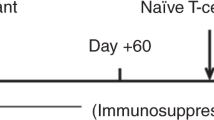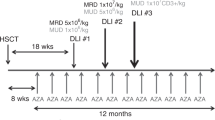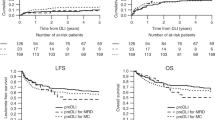Abstract
Donor lymphocyte infusions (DLI) are an effective treatment for patients with chronic myeloid leukemia (CML) in relapse after allografting but the optimal cell dose has yet to be identified. To address this question, we investigated the factors affecting the dose required to achieve remission (effective cell dose, (ECD)) in 81 patients treated with an escalating dose regimen. The overall proportion of patients who achieved a molecular remission was 88%. The cumulative proportion of remitters increased significantly at each dose level. With a CD3+ cell dose ⩽107/kg, 56% of patients in molecular/cytogenetic relapse obtained molecular remission, whereas only 20% of those in hematologic relapse did so. At the same cell dose, 58% of patients who received lymphocytes from volunteer unrelated donors achieved remission, as compared to 29% of those who received DLI from sibling donors. We conclude that the response to DLI is dose-dependent and that the ECD is influenced by the quantity and phase of CML at relapse and degree of donor/recipient histocompatibility.
This is a preview of subscription content, access via your institution
Access options
Subscribe to this journal
Receive 12 print issues and online access
$259.00 per year
only $21.58 per issue
Buy this article
- Purchase on Springer Link
- Instant access to full article PDF
Prices may be subject to local taxes which are calculated during checkout

Similar content being viewed by others
References
Weiden PL, Sullivan KM, Flournoy N, Storb R, Thomas ED . Antileukemic effect of chronic graft-versus-host disease: contribution to improved survival after allogeneic marrow transplantation. N Engl J Med 1981; 304: 1529–1533.
Goldman JM, Gale RP, Horowitz MM, Biggs JC, Champlin RE, Gluckman E et al. Bone marrow transplantation for chronic myelogenous leukemia in chronic phase. Increased risk for relapse associated with T-cell depletion. Ann Intern Med 1988; 108: 806–814.
Kolb HJ, Mittermuller J, Clemm C, Holler E, Ledderose G, Brehm G et al. Donor leukocyte transfusions for treatment of recurrent chronic myelogenous leukemia in marrow transplant patients. Blood 1990; 76: 2462–2465.
Collins Jr RH, Goldstein S, Giralt S, Levine J, Porter D, Drobyski W et al. Donor leukocyte infusions in acute lymphocytic leukemia. Bone Marrow Transplant 2000; 26: 511–516.
Collins Jr RH, Shpilberg O, Drobyski WR, Porter DL, Giralt S, Champlin R et al. Donor leukocyte infusions in 140 patients with relapsed malignancy after allogeneic bone marrow transplantation. J Clin Oncol 1997; 15: 433–444.
Dazzi F, Szydlo RM, Cross NC, Craddock C, Kaeda J, Kanfer E et al. Durability of responses following donor lymphocyte infusions for patients who relapse after allogeneic stem cell transplantation for chronic myeloid leukemia. Blood 2000; 96: 2712–2716.
Guglielmi C, Arcese W, Dazzi F, Brand R, Bunjes D, Verdonck LF et al. Donor lymphocyte infusion for relapsed chronic myelogenous leukemia: prognostic relevance of the initial cell dose. Blood 2002; 100: 397–405.
Lokhorst HM, Schattenberg A, Cornelissen JJ, van Oers MH, Fibbe W, Russell I et al. Donor lymphocyte infusions for relapsed multiple myeloma after allogeneic stem-cell transplantation: predictive factors for response and long-term outcome. J Clin Oncol 2000; 18: 3031–3037.
Porter DL, Collins Jr RH, Hardy C, Kernan NA, Drobyski WR, Giralt S et al. Treatment of relapsed leukemia after unrelated donor marrow transplantation with unrelated donor leukocyte infusions. Blood 2000; 95: 1214–1221.
Salama M, Nevill T, Marcellus D, Parker P, Johnson M, Kirk A et al. Donor leukocyte infusions for multiple myeloma. Bone Marrow Transplant 2000; 26: 1179–1184.
van Rhee F, Lin F, Cullis JO, Spencer A, Cross NC, Chase A et al. Relapse of chronic myeloid leukemia after allogeneic bone marrow transplant: the case for giving donor leukocyte transfusions before the onset of hematologic relapse. Blood 1994; 83: 3377–3383.
Kolb HJ, Schattenberg A, Goldman JM, Hertenstein B, Jacobsen N, Arcese W et al. Graft-versus-leukemia effect of donor lymphocyte transfusions in marrow grafted patients. Blood 1995; 86: 2041–2050.
Schattenberg A, Schaap N, Van De Wiel-Van Kemenade E, Bar B, Preijers F, Van Der Maazen R et al. In relapsed patients after lymphocyte depleted bone marrow transplantation the percentage of donor T lymphocytes correlates well with the outcome of donor leukocyte infusion. Leuk Lymphoma 1999; 32: 317–325.
Huff CA, Fuchs EJ, Smith BD, Blackford A, Garrett-Mayer E, Brodsky RA et al. Graft-versus-host reactions and the effectiveness of donor lymphocyte infusions. Biol Blood Marrow Transplant 2006; 12: 414–421.
Mackinnon S, Papadopoulos EB, Carabasi MH, Reich L, Collins NH, Boulad F et al. Adoptive immunotherapy evaluating escalating doses of donor leukocytes for relapse of chronic myeloid leukemia after bone marrow transplantation: separation of graft-versus-leukemia responses from graft-versus-host disease. Blood 1995; 86: 1261–1268.
Savage DG, Szydlo RM, Chase A, Apperley JF, Goldman JM . Bone marrow transplantation for chronic myeloid leukaemia: the effects of differing criteria for defining chronic phase on probabilities of survival and relapse. Br J Haematol 1997; 99: 30–35.
Spencer A, Szydlo RM, Brookes PA, Kaminski E, Rule S, van Rhee F et al. Bone marrow transplantation for chronic myeloid leukemia with volunteer unrelated donors using ex vivo or in vivo T-cell depletion: major prognostic impact of HLA class I identity between donor and recipient. Blood 1995; 86: 3590–3597.
Hochhaus A, Lin F, Reiter A, Skladny H, Mason PJ, van Rhee F et al. Quantification of residual disease in chronic myelogenous leukemia patients on interferon-alpha therapy by competitive polymerase chain reaction. Blood 1996; 87: 1549–1555.
Lin F, Drummond M, O'Brien S, Cervantes F, Goldman J, Kaeda J . Molecular monitoring in chronic myeloid leukemia patients who achieve complete cytogenetic remission on imatinib. Blood 2003; 102: 1143.
Kaeda J, O'Shea D, Szydlo RM, Olavarria E, Dazzi F, Marin D et al. Serial measurement of BCR-ABL transcripts in the peripheral blood after allogeneic stem cell transplantation for chronic myeloid leukemia: an attempt to define patients who may not require further therapy. Blood 2006; 107: 4171–4176.
Clift R, Goldman J, Gratwohl A, Horowitz M . Proposals for standardized reporting of results of bone marrow transplantation for leukaemia. Bone Marrow Transplant 1989; 4: 445–448.
Dazzi F, Szydlo RM, Craddock C, Cross NC, Kaeda J, Chase A et al. Comparison of single-dose and escalating-dose regimens of donor lymphocyte infusion for relapse after allografting for chronic myeloid leukemia. Blood 2000; 95: 67–71.
Cross NC, Feng L, Chase A, Bungey J, Hughes TP, Goldman JM . Competitive polymerase chain reaction to estimate the number of BCR-ABL transcripts in chronic myeloid leukemia patients after bone marrow transplantation. Blood 1993; 82: 1929–1936.
Glucksberg H, Storb R, Fefer A, Buckner CD, Neiman PE, Clift RA et al. Clinical manifestations of graft-versus-host disease in human recipients of marrow from HL-A-matched sibling donors. Transplantation 1974; 18: 295–304.
Raanani P, Dazzi F, Sohal J, Szydlo RM, van Rhee F, Reiter A et al. The rate and kinetics of molecular response to donor leucocyte transfusions in chronic myeloid leukaemia patients treated for relapse after allogeneic bone marrow transplantation. Br J Haematol 1997; 99: 945–950.
Smit WM, Rijnbeek M, van Bergen CA, Fibbe WE, Willemze R, Falkenburg JH . T cells recognizing leukemic CD34(+) progenitor cells mediate the antileukemic effect of donor lymphocyte infusions for relapsed chronic myeloid leukemia after allogeneic stem cell transplantation. Proc Natl Acad Sci USA 1998; 95: 10152–10157.
Russell NH, Byrne JL, Faulkner RD, Gilyead M, Das-Gupta EP, Haynes AP . Donor lymphocyte infusions can result in sustained remissions in patients with residual or relapsed lymphoid malignancy following allogeneic haemopoietic stem cell transplantation. Bone Marrow Transplant 2005; 36: 437–441.
Schwarer AP, Jiang YZ, Brookes PA, Barrett AJ, Batchelor JR, Goldman JM et al. Frequency of anti-recipient alloreactive helper T-cell precursors in donor blood and graft-versus-host disease after HLA-identical sibling bone-marrow transplantation. Lancet 1993; 341: 203–205.
Marijt WA, Heemskerk MH, Kloosterboer FM, Goulmy E, Kester MG, van der Hoorn MA et al. Hematopoiesis-restricted minor histocompatibility antigens HA-1- or HA-2-specific T cells can induce complete remissions of relapsed leukemia. Proc Natl Acad Sci USA 2003; 100: 2742–2747.
Olavarria E, Ottmann OG, Deininger M, Clark RE, Bandini G, Byrne J et al. Response to imatinib in patients who relapse after allogeneic stem cell transplantation for chronic myeloid leukemia. Leukemia 2003; 17: 1707–1712.
Weisser M, Tischer J, Schnittger S, Schoch C, Ledderose G, Kolb HJ . A comparison of donor lymphocyte infusions or imatinib mesylate for patients with chronic myelogenous leukemia who have relapsed after allogeneic stem cell transplantation. Haematologica 2006; 91: 663–666.
Savani BN, Montero A, Kurlander R, Childs R, Hensel N, Barrett AJ . Imatinib synergizes with donor lymphocyte infusions to achieve rapid molecular remission of CML relapsing after allogeneic stem cell transplantation. Bone Marrow Transplant 2005; 36: 1009–1015.
Acknowledgements
This work was partly supported by the Leukemia Research Fund. C Fozza is the recipient of the fellowship ‘Master and back TS 07’ offered by Regione Autonoma della Sardegna.
Author information
Authors and Affiliations
Corresponding author
Rights and permissions
About this article
Cite this article
Simula, M., Marktel, S., Fozza, C. et al. Response to donor lymphocyte infusions for chronic myeloid leukemia is dose-dependent: the importance of escalating the cell dose to maximize therapeutic efficacy. Leukemia 21, 943–948 (2007). https://doi.org/10.1038/sj.leu.2404641
Received:
Revised:
Accepted:
Published:
Issue Date:
DOI: https://doi.org/10.1038/sj.leu.2404641
Keywords
This article is cited by
-
Adoptive therapy with donor lymphocyte infusion after allogenic hematopoietic SCT in pediatric patients
Bone Marrow Transplantation (2015)
-
T Cell Immunotherapy for Immune Reconstitution and GVHD Prevention After Allogeneic Hematopoietic Stem Cell Transplantation
Current Stem Cell Reports (2015)
-
HLA and KIR genotyping correlates with relapse after T-cell-replete haploidentical transplantation in chronic myeloid leukaemia patients
British Journal of Cancer (2014)
-
Donor lymphocyte infusions for the treatment of chronic myeloid leukemia relapse following peripheral blood or bone marrow stem cell transplantation
Bone Marrow Transplantation (2013)
-
Escalating-dose HLA-mismatched DLI is safe for the treatment of leukaemia relapse following alemtuzumab-based myeloablative allo-SCT
Bone Marrow Transplantation (2013)



